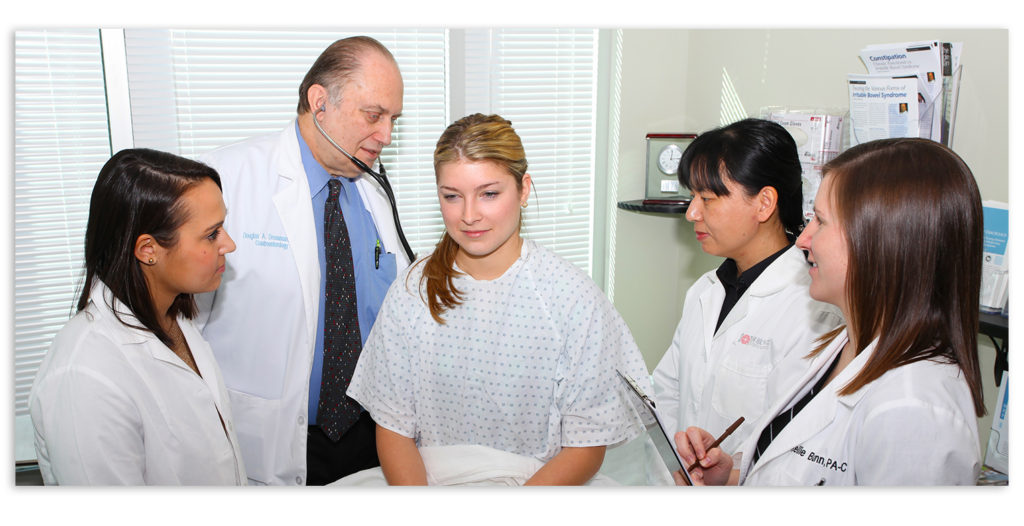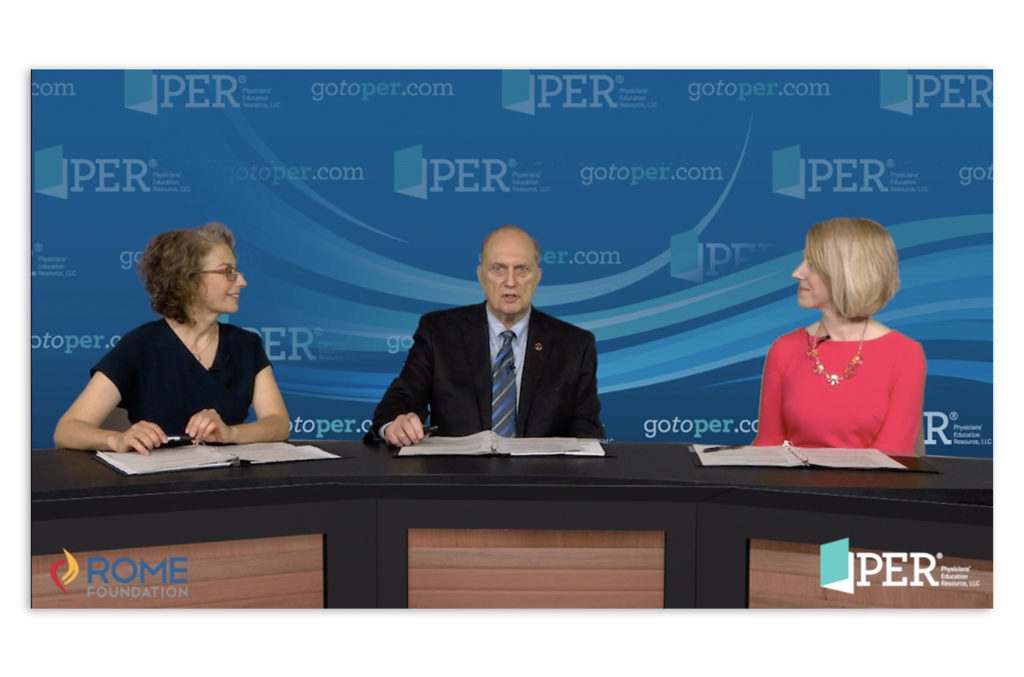Optimizing the patient-provider relationship.
A multi-component curriculum teaching communication skills
to improve patient-centered care.
> Self-Learning Educational Videos
Educational videos are learning tools that can teach the sophistication and complexity of the medical interview.
Our most recent educational video series:
Communication 101
Communication 101 Program Sample Video
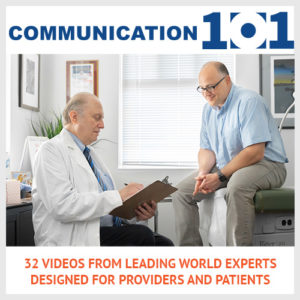
A video approach to help clinicians rapidly convey key clinical messages to patients with Disorders of gut-brain interaction (DGBI).
This program is an innovative video learning tool for clinicians who work with patients having Disorders of Gut-Brain Interaction (Functional GI Disorders).
It leverages the expertise of 15 thought leaders in neurogastroenterology to demonstrate how they educate patients with DGBIs on the most common clinical issues that arise in the course of a clinical visit.
After reviewing Communication 101, you will be able to:
- Help your patient quickly understand their symptoms, disorders and proper treatments
- Cover a wide variety of complex topics clearly, thoroughly and concisely
- Maximize the likelihood that your patients will be satisfied knowing what they have and how they will be treated
Included are 32 educational discussions, covering 11 content categories. Some of the topics may seem difficult to explain to a patient. Therefore, our experts approach each video demonstration with full knowledge of the content and provide the clinical expertise to interpret the information clearly and concisely using practical communication methods. The interviews are brief, only 3-8 minutes, and include a detailed written statement describing what was said and why. For some topics, more than one clinician demonstrates their approach so the learner can select which method best fits their style.
Communication 101.5
Communication 101.5 Program Sample Video
After reviewing Communication 101.5, you will be able to:
- Understand complex underlying interpersonal dynamics leading to confrontative encounters
- Understand the patient’s perspective
- Learn how to offer empathy, negotiate and set boundaries to achieve the intended results
- Apply methods to address both patient and doctor concerns
- Maximize the likelihood of establishing patient and doctor satisfaction and a mutually agreed plan of care
- Help the patient leave the office trusting and satisfied with the plan of care
Communication 202
Communication 202 Program Sample Video
Offers a deeper understanding of GI illness through a patient-centered approach through 6 clinical visits, each containing four components that illustrate:
- An ineffective interview
- An effective interview
- The patient’s perspective of these interactions
- A detailed step-by-step critique of the interview process
This approach demonstrates methods to improve patient-centered care, psychosocial assessment, and shared decision-making, which ultimately optimizes the patient-provider relationship. These video vignettes serve as templates to explore in greater depth the patient’s concerns and behaviors and, at a deeper level, the meaning of the illness that drives the clinical presentation.
Communication 202 provides not only the basics of interviewing skills such as active listening, providing empathy and negotiating treatment, but it also offers techniques to manage deeper clinical issues: identifying hidden agendas, emotion handling of anger and sadness, implementing shared decision making, addressing drug seeking, and identifying and successfully managing factitious illness, early trauma, unresolved grief and other complex clinical issues.
Approach to a patient with Severe Chronic Abdominal Pain: How to engage, educate and achieve collaborative care
Click Here to View Approach to Patient with Severe Abdominal Pain Sample Video
We appreciate your interest in our multi-component module on the interaction with Ms. Byers a simulated patient with multiple diagnoses. This patient has the following diagnoses:
- Post-infection IBS
- Opioid-induced constipation
- Narcotic Bowel Syndrome
- Centrally mediated abdominal pain
- Psychosocial difficulties, including
- History of abuse and trauma
- Somatic symptom disorder
- Visceral anxiety
- Depression
- Opioid-seeking behavior
This module is designed to help the provider understand these disorders, engage with the patient in an effective patient-provider relationship, and use good communication skills to recommend effective treatments. This module contains the following educational materials.
- A video of a simulated patient interview presented as a first-time clinic visit that includes
- An opening statement by Dr. Drossman and Ms. Ruddy to introduce the clinic visit
- Ms. Byers initial presentation to Dr. Drossman
- Discussion of the key aspects of this first visit by Dr. Drossman and Ms. Ruddy
- Simulated interview of Ms. Byers and Dr. Drossman after the physical examination. Dr. Drossman provides a clear diagnosis and education on their pathophysiology and treatment. The information is presented using effective communication skills that engage the patient in learning. There is a post-interview discussion by Dr. Drossman and Ms. Ruddy
- The slide deck used in the video for your self-learning.
- The key publications that address the content of the interview:
- Post-infection IBS
- Opioid-induced constipation
- Narcotic bowel syndrome
- Centrally Mediated Abdominal Pain
- Abuse Trauma and GI Illness
- Brain Imaging in patients with an abuse history
- Neuromodulators to treat DBGI
- Brain-Gut Behavioral Treatments
- Communication Skills to Improve the Patient-Provider Relationship
> Educational Workshops for Faculty and Trainees at Medical Centers
We conduct workshops on-site to teach our effective communication methods at major medical centers using a variety of learner-centered methods: lectures, video discussion, role play, and small group facilitation. The learners identify the areas of greatest need and we structure the program accordingly.
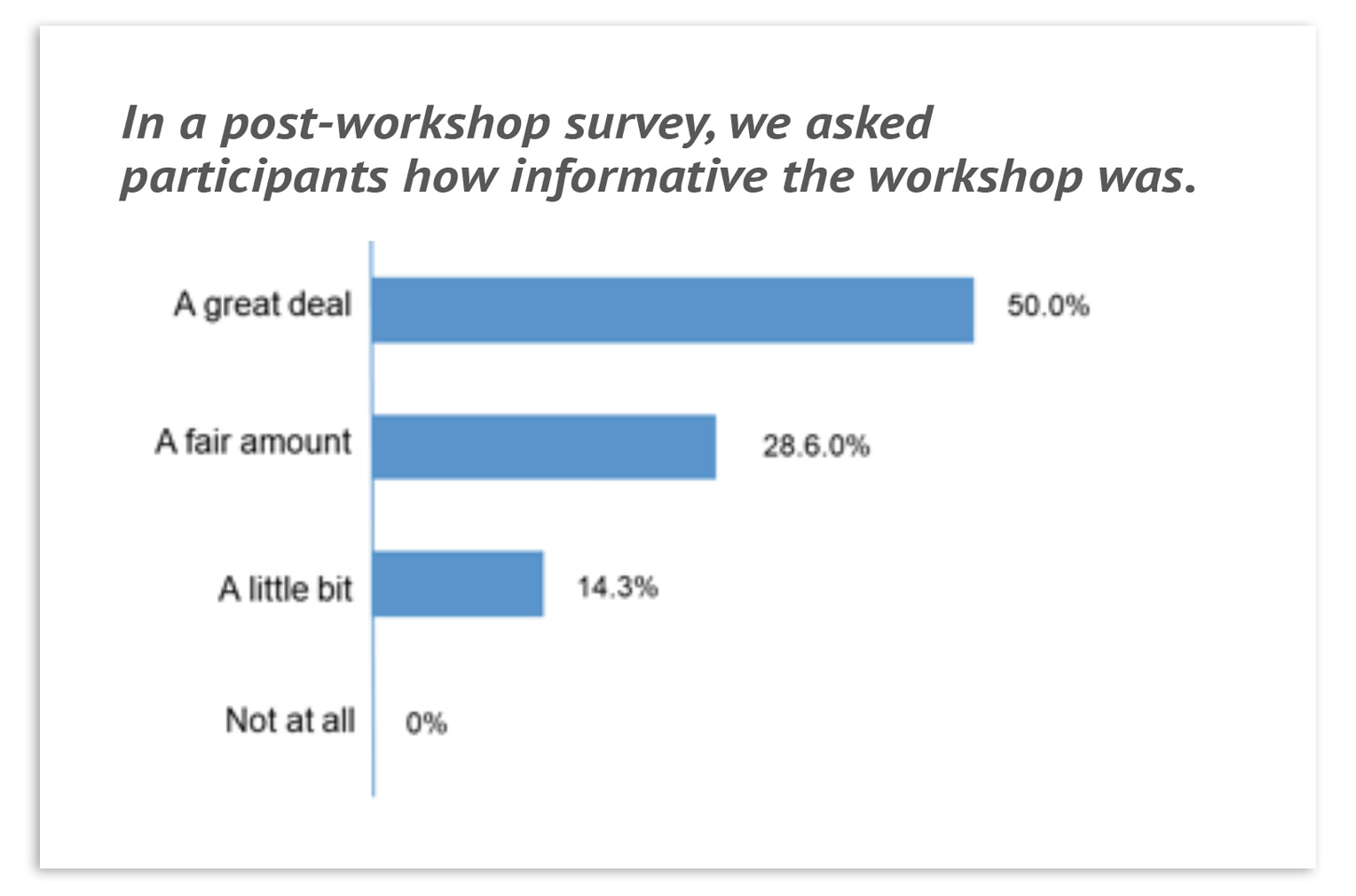
> Symposia, Satellite Symposia, and Webinars
We develop symposia for gastroenterologists, trainees, mid-level, and allied health care practitioners. Examples can be seen at bit.ly/2qfcdo8. We have also published articles in highly rated peer review journals to demonstrate the impact of effective communication for patient and clinician. Go to this link to access our publications in Gastroenterology and an accompanying video bit.ly/2KprU9h.
> Publication Guidelines on Communication (Rome Working Team Report)
The Foundation successfully publishes working team reports in high-quality peer-reviewed journals on a variety of topics over the last year. Over the next year we will develop a working team report that includes an evidence-based review of how to communicate effectively with their patients to improve clinical outcomes.
- Drossman DA, Ruddy J. Gut Feelings: Doctors and Patient-Centered Care. DrossmanCare 2023, pp 1-260
- Drossman DA, Ruddy J. Gut Feelings: The Patient’s Perspective. DrossmanCare 2022 pp 1-188.
- Drossman DA, Palsson O, Stein E. What elements in the physician-patient relationship contribute to patient satisfaction; Development of PPRS Patient SF Questionnaire Neurogastroenterol and Motil 2022
- Drossman DA, Chang L, Deutsch JK, Ford AC, Halpert A, Kroenke K, Nurko S, Ruddy J, Snyder J, Sperber A. A Review of the Evidence and Recommendations on Communication Skills and the Patient-Provider Relationship (PPR). Gastroenterology;2021;161:1670-1688
- Drossman DA, Ruddy J. Gut Feelings: Disorders of Gut-Brain Interaction and the Patient-Doctor Relationship. DrossmanCare 2021 pp 1-207
- Drossman DA, Ruddy J. Improving patient-provider relationships to improve health care. Clin Gastroenterol and Hep 2020;18:1417-1426
- Drossman DA, Ruddy J. Communication skills in disorders of gut-brain interaction. Neurogastro Latam Reviews 2019;2:1-14
- Ruddy J. From pretending to truly being OK: A journey from illness to health with PI-IBS: the patient’s perspective. Gastroenterology 2018;155:1666-1669
- Drossman DA. From pretending to truly being OK: A journey from illness to health with PI-IBS: the provider’s perspective. Gastroenterology 2018;155:1664-1665
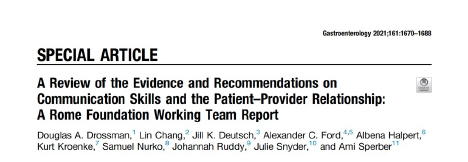
> Train the Trainers: 1-½ Day Intensive Seminars to Recruit Future Faculty
We have provided 1.5 day intensive seminars for university-based medical faculty interested in improving their skills by teaching more effective patient-provider communication. This training will help us expand the impact of our methods to thought leaders who already provide the most up-to-date knowledge involving complex case discussions and will then serve as facilitators for future communication skills programs. Click here for more information about our programs!
Visit bit.ly/2s4U6Td to see what it is like in our program developed for the AGA.
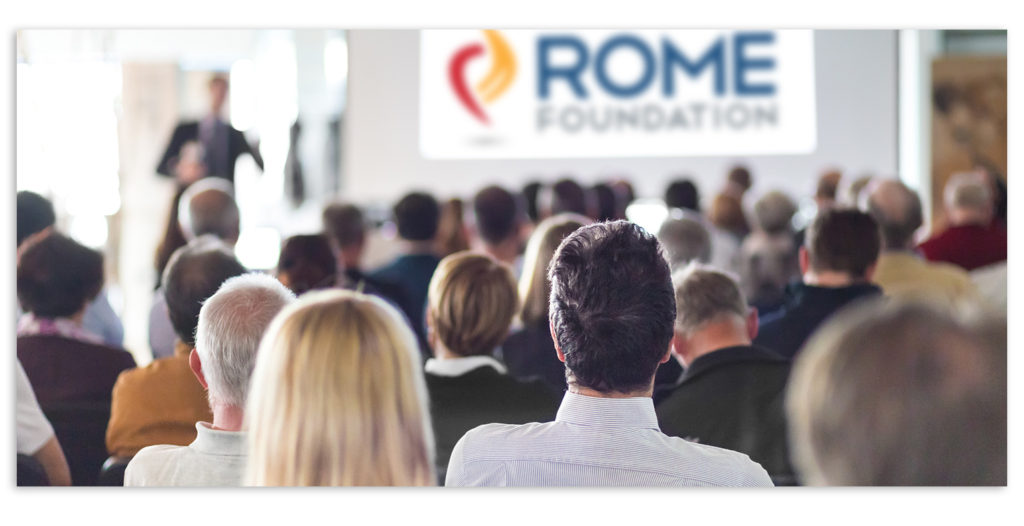
> Visiting Scholar Preceptorship Program
For many years, and from all over the world, gastroenterologists, trainees, psychologists, and mid-level providers have visited the practices of Rome Board members to be precepted on DGBI and also learn communication skills. The Rome Foundation Visiting Scholar Program is an excellent way for researchers and clinicians to engage with key leaders and learn about advanced research techniques, patient-focused care, and advanced communication skills. Faculty spend two to three days on-site. This program is critical in developing the next generation of providers to become skilled communicators and exceptional physicians managing and treating patients with DGBI. For further information, click here.
